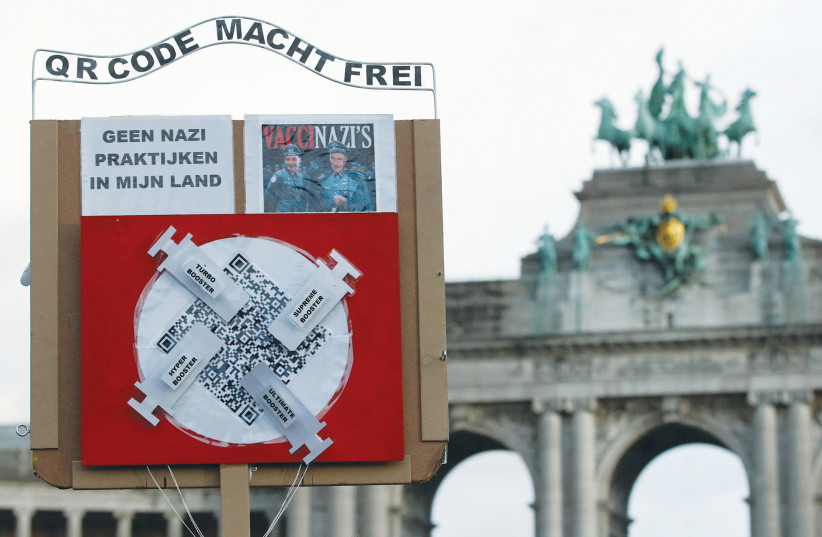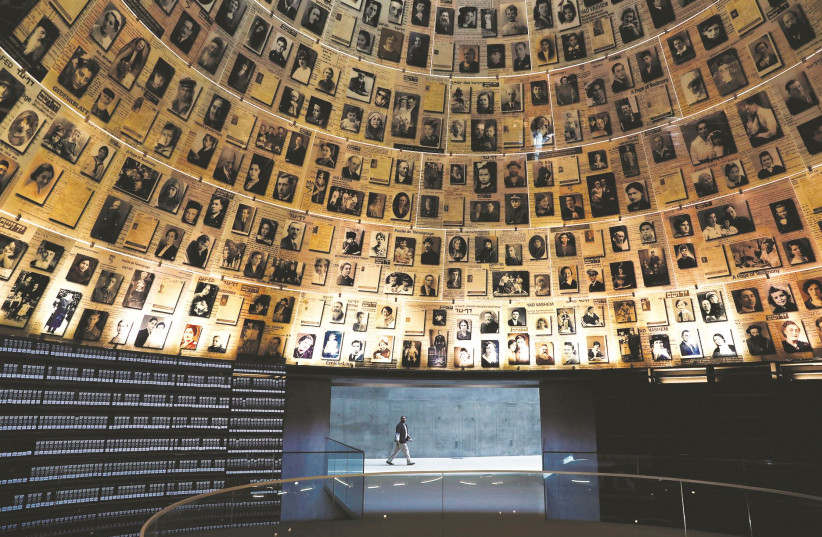 Our mission to remember the Holocaust – opinion
Our mission to remember the Holocaust – opinion
ALYSSA ANNIS
Anti-lockdown protesters proudly wearing swastikas along with those who are wearing a yellow star on their chest showing they refuse to get vaccinated display the persistence of antisemitism.

Lately, not a week goes by without the tragic news of another Holocaust survivor passing away. To name a few: Henry Orenstein, Freda Wineman and Jack Feldman. Each of these examples spent many years educating on the dark times of the past. Not only did they spread their story but they made sure their voice was heard.
It’s been more than 75 years since the physical devastation of the Holocaust ended and, although the last 40+ years brought the advancement of Holocaust education, and with it, the sharing of the tragic stories of both the survivors and the victims, the question of whether the world has learned from this tragic past still lingers. Even now, every week there is some form of blatant antisemitism and recent statistics by the BBC show in the first six months of 2021 there was a record amount of antisemitism in Britain. In addition, a report by the American Jewish Committee (one of the oldest Jewish advocacy organizations in America) concluded that in 2021 one in four Jewish people in America faced antisemitism. Social media is full of hatred toward the Jewish people and posts endorsing Holocaust denial. Despite the great achievements by many to help eradicate this hatred, it reappears and spreads faster than can currently be contained.
It is the 21st century and the development of technology has transformed our lives, with the Internet now mandatory in most households and social media being used by millions worldwide. So, how is it that with all these steps to improve our way of life, hatred still finds ways to invade? If we look at the events of the past year, I would say that despite mass technological advancements we are indeed regressing back in time.
Over the past year, there have been anti-lockdown protests with protesters proudly wearing swastikas along with those who are wearing a yellow star on their chest showing they refuse to vaccinate themselves. As well, Texas decided to teach “opposing views” of the Holocaust. Harmful antisemitism spreads online. Isn’t this proof that despite the greatest efforts of many, our future may not be brighter than our past?
Well, it is indeed modernization that has caused the greater spread of hateful messages and even encouraged Holocaust denial conspiracy theories. By using social media, one can spread messages online to thousands of people, instead of just the people with whom they surround themselves. Additionally, a benefit of globalization is that it has enabled people to make contacts around the world; this is a way for messages to not only spread online, but spread rapidly to a global audience.

It is not enough for those who have a personal connection to the Holocaust to speak out. It is not enough to rely on a one-week trip to Poland. It is not enough to read books on the Holocaust. We need to be active. By learning about those dark times together, we can pave the way for a safer future, but we need to do more and find ways which work for our 21st century way of life.
In the words of Simon Wiesenthal, “For evil to flourish, it only requires good men to do nothing.” Therefore, I invite you to join Instagram @mymissiontoremember and ensure you are not only educated on the Holocaust, but that you reach out: You can find yourself a survivor to share their story with you, discover a great Holocaust Museum close by and do all you can to help society in its fight to not let history repeat itself. By educating ourselves about the Holocaust, you can ensure a safer future in which we can be proud to raise Jewish children knowing it will be an accepting society, and a society where a person can walk to a mosque without fear and simply walk down a street proud to represent themselves, their uniqueness and their religion.
Together, let’s make sure that we embrace the responsibility to remember those dark days, and when all the witnesses can no longer share their stories, that we are ready to embrace our role and improve society.
The writer is a second-year government and diplomacy student at Reichman University in Herzliya and an online Holocaust educator on Instagram @mymissiontoremember.
Zawartość publikowanych artykułów i materiałów nie reprezentuje poglądów ani opinii Reunion’68,
ani też webmastera Blogu Reunion’68, chyba ze jest to wyraźnie zaznaczone.
Twoje uwagi, linki, własne artykuły lub wiadomości prześlij na adres:
webmaster@reunion68.com
